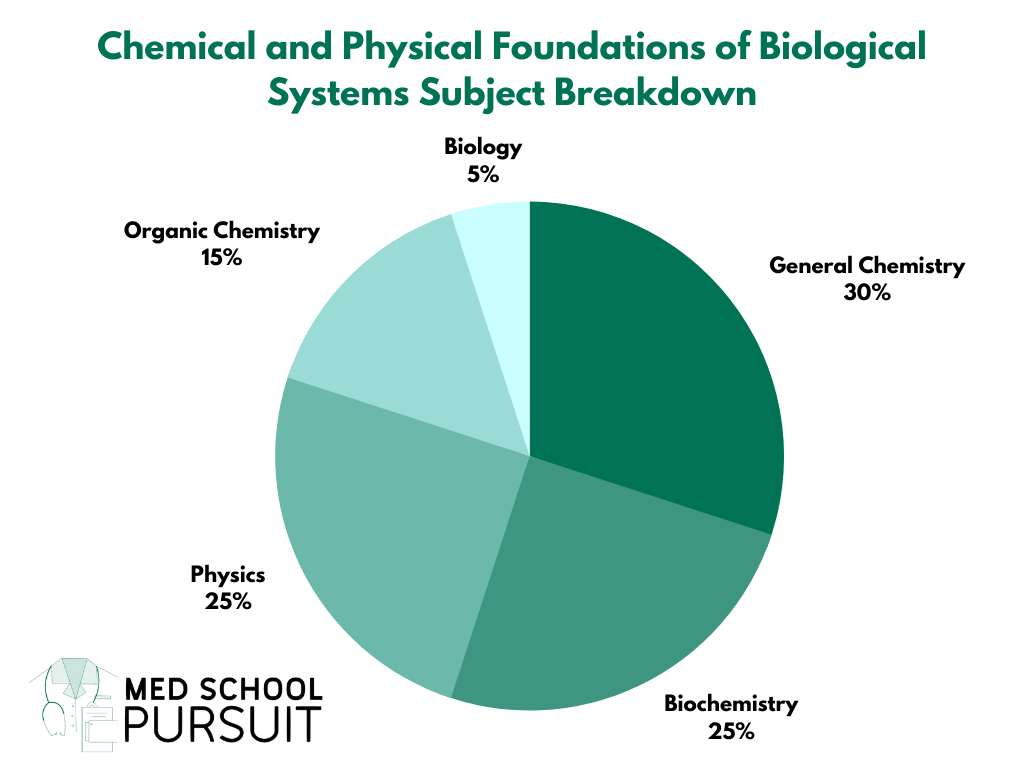If you are like most premed students, physics is not your strong suit. Especially if you haven’t taken the subject for over a year.
When I started studying for the MCAT, I couldn’t be more lost with some of the topics like torque, buoyancy, sound, etc.
Part of me was just hoping that there wasn’t enough physics on the MCAT to justify spending the time to really learn these concepts.
Which brings me to the question of this post: Is physics heavily or lightly tested on the MCAT?
The good news is that most premed students and MCAT tutors agree that there is less physics on the new MCAT when compared to the old one.
It’s also worth noting that the physics on the new MCAT is tested based on how it relates to biology and biochemistry. This is a little strange when thinking about it from a physics standpoint but maybe more relatable for a biology major.
First things first…
What Percent Of The MCAT Is Physics?
According to the AAMC, the Chemical and Physical Foundations of Biological Systems section of the MCAT contains about 25% physics. This is 1 our of 4 sections on the MCAT. Therefore, about 6.25% of the MCAT is physics.

Keep in mind that these percentages are not written in stone. They are averages. Some students experience a lot of physics on their MCAT while others might have hardly any.
Yes, these percentages are pretty small compared to something like biology, but don’t let yourself feel too at ease. The last thing you want to do is end up with an egg on your face because you didn’t prepare for physics and your test happened to heavily test that subject.
I put these percentages out there so that you can prioritize more time on more important subjects. Not so that you can skip studying physics altogether.
MCAT Physics Topics You Need To Know
Technically speaking, you need to know every general physics topic. Everything is fair game.
However, there are higher-yield topics that you should make sure you have a very solid grasp on.
We compiled a list of all the MCAT high-yield topics based on a bunch of resources and 25 actual MCAT test-takers. You can find that list of topics here.
Since we are talking about physics specifically, I’ll show you that list here:
- Physics
- Waves
- Kinematic forces
- Buoyancy forces
- Work
- Fluids
- Electrostatics
- Capacitors/resistors/series/parallel
- E=hf
- Optics
- Decay
- Pendulum
- A1v1=A2v2 for fluids
- Bernoulli’s equation
- Doppler effect
- Elastic vs inelastic collision
- Torque
- Sound
- Lenses
- Gravity
What Physics Classes Should You Take Before The MCAT?
The standard premed curriculum involves physics 1 and 2. Sometimes we don’t have time for both semesters of physics before studying for the MCAT.
The question is, do you need to take both physics classes before taking the MCAT?
Yes, you should. The MCAT contains content from both semesters of physics and actually weighs General Physics 2 more than 1. Taking Gen Phys 2 before 1 is not practical so you are basically forced to take both.
How To Study For Physics On The MCAT
When it comes to studying physics on the MCAT, there are 3 strategies we recommend:
- Do lots and lots of practice problems. This is important for any subject on the MCAT. If you want to do well, you need to figure out how the MCAT likes to test you on subjects. The more you practice, the more you will put yourself in the test-makers mindset. In addition to this, practicing passages is an active form of learning that will engage your mind at a higher level with the physics topics.
- Have a strong foundation of the basics. Physics is one of those subjects which builds on itself. When you have a strong grasp of how forces and vectors work with one another, you can fill in the blanks if you forget more complex concepts.
- Utilize Khan Academy’s videos. Khan Academy does a great job with its physics videos. I personally used them when struggling to understand more difficult topics like torque, circuits, and sound waves. With physics, it’s very helpful to have a visual representation alongside your written material.
If you follow these three tips, you should have no problem doing well on the physics portion of the MCAT!
MCAT Physics Practice Problems
As I mentioned earlier, being prepared for physics on the MCAT means doing practice problems. A quick disclaimer, the new MCAT does not contain any passages that strictly address physics. They are a blend of multiple disciplines usually relying on some sort of biological foundation.
Therefore, all the practice problems below are either going to be outdated and therefore better for content review or mixed with other science subjects.
Here are our top choices:
- AAMC: The best practice material out there is the AAMC’s stuff. They are the creators of the MCAT after all. The majority of the material is going to include all of the sciences. However, there are some question packs on physics that are good for really nailing down that content.
- NextStep (Now Blueprint): Blueprint (formally NextStep) has excellent practice passages and problems. In my opinion, they are second to the AAMC. They have a great physics and chemistry practice book as well as some great full-length practice exams.
- ExamKrackers: Our third choice for physics practice problems is ExamKrackers. EK’s strength lies in their 1001 discrete problems book. You won’t be getting any passages in these books, but they are very good for nailing down content.